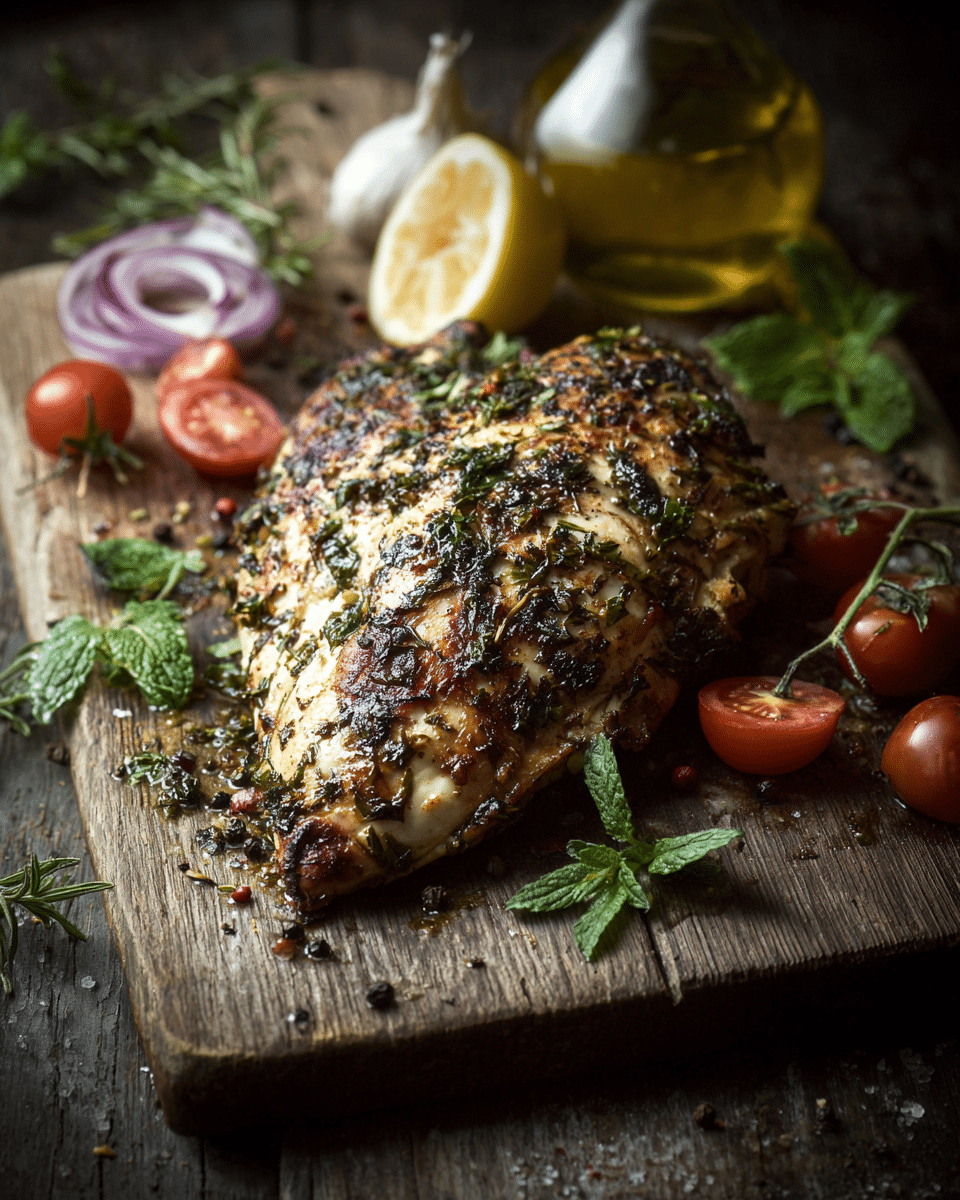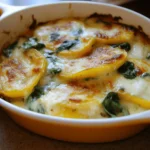Middle Eastern Herb Chicken is a flavorful and aromatic dish that brings together the vibrant spices and fresh herbs characteristic of Middle Eastern cuisine. Perfect for Labor Day gatherings, this recipe features tender chicken marinated in a blend of garlic, olive oil, lemon, and a medley of herbs like parsley, mint, and cilantro.
FULL RECIPE
Ingredients
- 4 boneless, skinless chicken breasts (or thighs)
- 3 tablespoons olive oil
- 3 cloves garlic, minced
- 2 tablespoons fresh lemon juice
- 1 teaspoon lemon zest
- 2 tablespoons fresh parsley, chopped
- 2 tablespoons fresh cilantro, chopped
- 1 tablespoon fresh mint, chopped
- 1 teaspoon ground cumin
- 1 teaspoon ground coriander
- 1 teaspoon smoked paprika
- ½ teaspoon ground turmeric
- ½ teaspoon ground black pepper
- 1 teaspoon salt (or to taste)
- Lemon wedges, for serving
Directions
- In a medium bowl, combine olive oil, minced garlic, lemon juice, lemon zest, parsley, cilantro, mint, cumin, coriander, paprika, turmeric, black pepper, and salt. Mix well to form a marinade.
- Place the chicken breasts in a resealable plastic bag or shallow dish. Pour the marinade over the chicken, ensuring each piece is fully coated.
- Seal the bag or cover the dish and refrigerate for at least 1 hour, preferably up to 6 hours, to allow the flavors to penetrate the meat.
- Preheat a grill or grill pan over medium-high heat. Lightly oil the grill grates to prevent sticking.
- Remove the chicken from the marinade, allowing any excess to drip off.
- Grill the chicken for 5–7 minutes per side, or until the internal temperature reaches 165°F (74°C).
- Transfer the chicken to a plate and let it rest for 5 minutes before slicing.
- Serve warm with lemon wedges on the side for extra brightness.
Nutrition Facts
- Calories: 255
- Total Fat: 12g
- Saturated Fat: 2g
- Trans Fat: 0g
- Cholesterol: 85mg
- Sodium: 480mg
- Total Carbohydrates: 2g
- Dietary Fiber: 1g
- Sugars: 0g
- Protein: 34g
- Vitamin A: 15% DV
- Vitamin C: 20% DV
- Calcium: 4% DV
- Iron: 10% DV
The Essence of Middle Eastern Herb Chicken
Middle Eastern Herb Chicken is more than just a flavorful main dish—it’s a celebration of aromatic spices and fresh herbs that have been a cornerstone of Middle Eastern cooking for centuries. This dish captures the balance between earthy, tangy, and fresh flavors, creating a vibrant profile that appeals to a wide range of palates. The combination of cumin, coriander, paprika, and turmeric with fresh parsley, cilantro, and mint offers both depth and brightness. As a Labor Day centerpiece, it stands out because it’s satisfying yet light enough for a warm-weather feast, making it an ideal choice for grilling and outdoor dining.
Health Benefits of Herb-Infused Chicken
Chicken is a lean protein source that supports muscle maintenance and helps keep you full without adding excessive fat. The herbs and spices in this dish add more than just flavor—they contribute antioxidants, anti-inflammatory compounds, and essential vitamins. For example, parsley is rich in vitamin K, mint aids digestion, and turmeric is known for its curcumin content, which has potential anti-inflammatory effects. By using olive oil instead of heavier fats, the dish stays heart-healthy while still delivering richness. This makes Middle Eastern Herb Chicken a nutritious yet indulgent choice for celebratory meals.
The Role of Marinades in Flavor and Tenderness
A key reason Middle Eastern Herb Chicken is so flavorful lies in its marination process. Marinating allows the acidic lemon juice to tenderize the meat while olive oil helps retain moisture during grilling. The herbs and spices infuse into the chicken over time, creating layers of flavor that reach beyond the surface. Ideally, the chicken should marinate for at least an hour, though overnight marination produces even deeper results. This simple but effective technique ensures that every bite bursts with flavor and juiciness, setting it apart from plain grilled chicken.
Regional Influences on the Flavor Profile
The flavors in this dish draw from multiple Middle Eastern culinary traditions, blending Mediterranean brightness with Levantine spice combinations. Cumin and coriander are staples across the region, while fresh herbs like parsley and mint reflect the influence of Levantine and North African cuisines. The smoky paprika hints at influences from Turkish and Moroccan cooking, where smoked spices are used to add complexity. This fusion of herbs and spices creates a dish that feels authentic yet adaptable, allowing cooks to explore different regional accents within the same recipe.
Serving Suggestions for Labor Day Gatherings
Middle Eastern Herb Chicken is versatile when it comes to presentation and serving style. For a casual Labor Day barbecue, serve the chicken sliced alongside grilled vegetables and fresh pita bread for easy, hand-held enjoyment. For a more formal setup, plate it with a colorful salad, such as tabbouleh or fattoush, for a complete and balanced meal. You can also serve it family-style on a large platter with fresh lemon wedges, allowing guests to customize their own servings. This adaptability makes it perfect for gatherings where you want both flavor and flexibility.
Perfect Side Dish Pairings
The bright, herbaceous flavors of this chicken pair well with a variety of side dishes. Rice pilaf with nuts and dried fruit adds a subtle sweetness and texture contrast. Roasted or grilled vegetables like zucchini, eggplant, or bell peppers complement the smoky notes from the grill. Creamy hummus or baba ganoush adds a smooth, savory element, while a cucumber-yogurt dip like tzatziki provides a cooling contrast to the spices. These sides not only enhance the flavors but also create a balanced and visually appealing spread for guests.
Adapting the Recipe for Different Cooking Methods
While grilling is the traditional choice for this dish, it can easily be adapted for other cooking methods. Pan-searing on the stovetop creates a golden crust and retains juiciness, especially if finished in the oven. Baking is a hands-off method that works well for larger batches, while air frying offers a crispy exterior without excess oil. For an indoor smoky flavor, a cast-iron grill pan can replicate the char of an outdoor grill. These variations ensure the dish can be enjoyed year-round, even when grilling outdoors isn’t an option.
Storage and Leftover Ideas
Leftover Middle Eastern Herb Chicken keeps well for up to three days in the refrigerator when stored in an airtight container. The flavors often deepen after a day, making it perfect for meal prep. Sliced leftovers can be added to salads, wraps, or grain bowls for quick lunches. They also make an excellent topping for flatbreads or pizzas with a Middle Eastern twist. If freezing, store the chicken in a freezer-safe bag with as much air removed as possible, and reheat gently to preserve moisture and texture.
Creative Garnishing Techniques
Garnishing adds both beauty and freshness to Middle Eastern Herb Chicken. A sprinkling of pomegranate seeds provides a burst of color and tangy sweetness. Fresh herbs like parsley or mint can be scattered over the top just before serving for extra aroma. Toasted sesame seeds or slivered almonds can add a nutty crunch that complements the smoky flavors. Drizzling a little extra virgin olive oil and a squeeze of lemon juice right before serving also brightens the flavors, making each bite feel freshly prepared.
Advertisement
Conclusion
Middle Eastern Herb Chicken brings together the vibrant herbs, warming spices, and citrus brightness that make Middle Eastern cuisine so beloved. It’s a healthy yet indulgent dish that’s perfect for special occasions like Labor Day, offering flexibility in preparation, pairing, and presentation. From the marination process that locks in flavor to the versatility in side dishes and cooking methods, this recipe delivers both cultural richness and crowd-pleasing taste.






